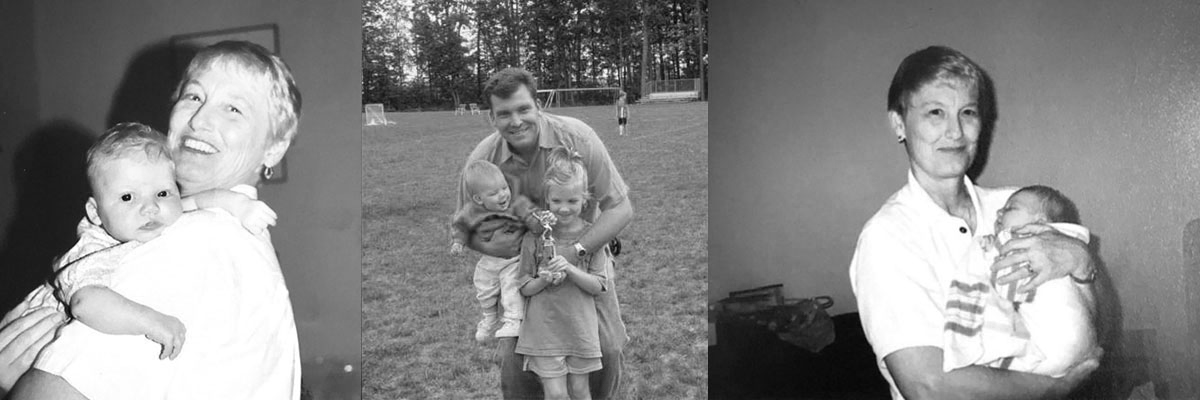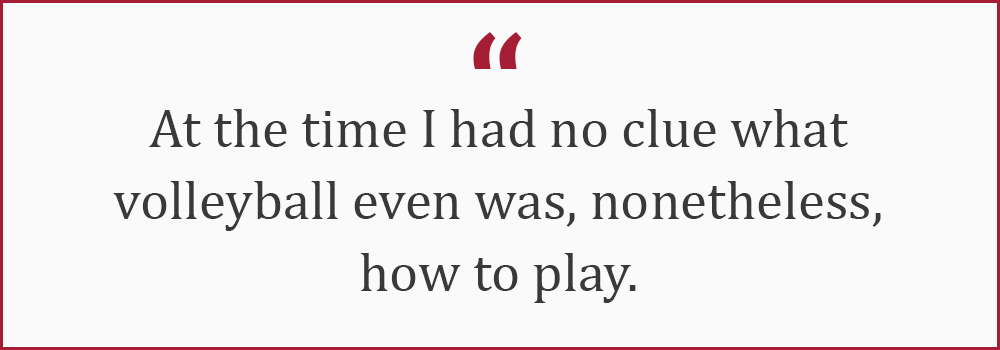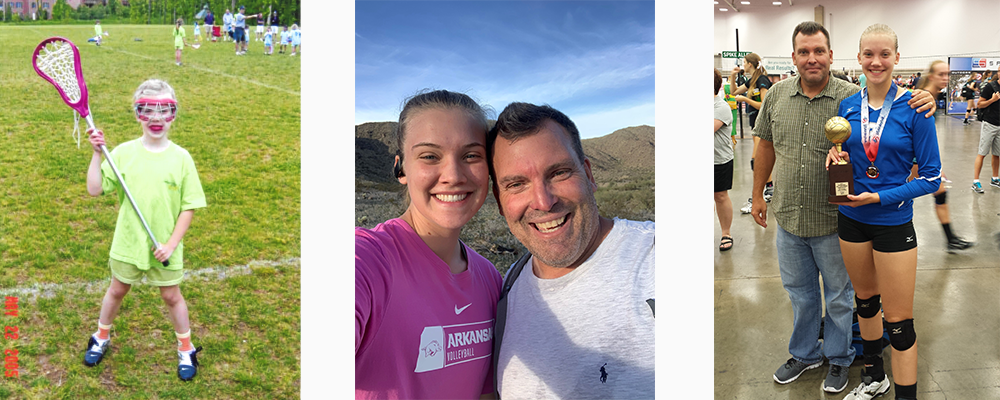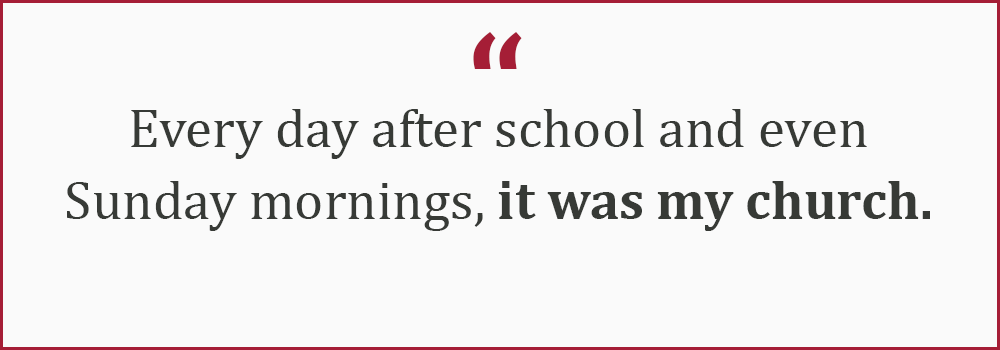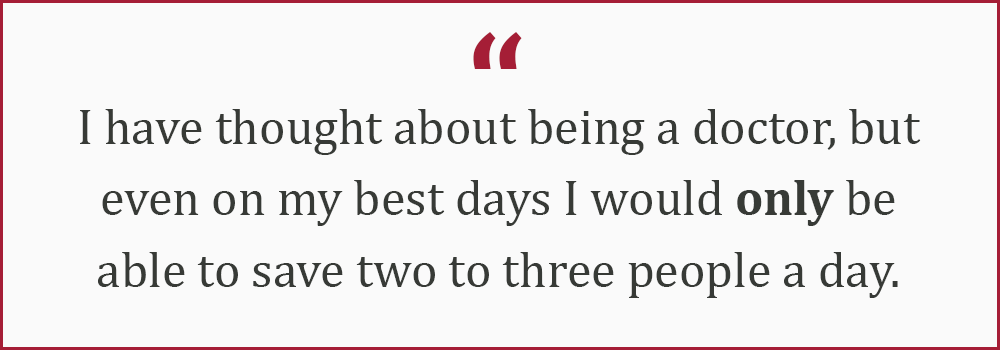My volleyball career path is not like many others, how it started is what made me into the athlete I am today. It gave me my grit, it put that chip on my shoulder.
My dad has always been my coach, since I started competing in sports when I was a toddler. He was a lacrosse star at Syracuse, so of course that’s what I grew up playing. That was when we lived in Maryland, I have so many pictures of me playing soccer, basketball and lacrosse.
But then we moved to Arizona, and I missed lacrosse tryouts. I was devastated. It was the summertime, school wasn’t in session, and its too hot in Arizona to play outside, so I was new to town and alone and had no way of making friends. All these preconceived notions I had about socializing and how to make friends were completely diminished.
So we’ve been in Arizona for, couldn’t have been more than two weeks, my dad walks into the local YMCA and asks this one woman named Deb Rothstein, and she swears she’s the one who got me involved in volleyball, the first one who put a volleyball in my hands – but anyway, my dad asks her, “what is the most popular female sport in Arizona?” And she says, “without a doubt, volleyball.” So, my dad signed me up to play for the local league, and at the time I had no clue what volleyball even was, nonetheless, how to play.
We went straight to work and at the first practice, I’m in tears. I was so frustrated, I wanted nothing to do with volleyball, I just wanted to go home. I just wanted to quit.
My dad looked at me in the eyes and said, “You’re not quitting. You signed up for this. You don’t ever have to play again but you’re not a quitter. You’re not quitting.”
I came home and had no idea how to cope with not knowing how to play the sport. I grew up playing lacrosse and it was a totally different physiological movement for my body, I was so used to focusing on my feet or working with my stick and hand-eye coordination. My dad and I spent so much time in the yard practicing lacrosse in Maryland, my goal was to make the national team and the transition was more than I wanted to handle.
I laugh now, because well, I just hated it so much. I hated the idea of playing volleyball.
But I started making friends and I became “okay” at the sport, so I stuck with it and played about three seasons at the YMCA, which is about a year. Then all my friends were getting ready to try out for club teams, and I wanted to play with my friends, so I signed up as well.
And I’ll never forget that moment at the end of the tryouts, I was standing right in front of the coach and he’s calling out all the names of the players who made the team and I don’t hear my name. I had been cut.
It took everything I had to not burst into tears. I was so embarrassed, but so humbled at the same time. I had to swallow my pride and not make a scene. I held it all in until I got to the car and then I just lost it. I cried all the way home and then went and spent the entire day crying into my pillow.
My dad walked in later and sat on my bed and said to me, “Do you really want this? Do you really want to play volleyball?” I said, “Yes I do, I’ll do whatever it takes.” And he told me, “Okay, let’s go to work.”
Then from sixth grade through tenth grade, we worked, every day. I’d get home from school, change, and we’d go to the local rec center and practice from anywhere to 30 minutes to an hour on the racquetball courts. Didn’t matter if I had practice or beach volleyball, a tournament, it didn’t matter we were going to the rec center and we were going to sweat. I think in that time I swung at over 3,000 volleyballs.
I’m so grateful for my dad for that, he pushed me to my limits, and he supported my dreams.
Ninth grade came around and I tried out for the team and I made junior varsity (JV). I was mad, oh I was mad. All my dad had to say to me was, “alright, lets go to the gym,” and we went. We worked on defense, on blocking moves and hitting, we worked on everything. I just kept swinging, over and over. Every day after school and even Sunday mornings, it was my church.
That’s where the chip on my shoulder comes from, all the hard work I put in. I won’t ever let anyone outwork me. That’s the one thing. You can do whatever drills you want, and you may be a better player than me, but you will not out work me, ever.
Even now, I’m in the gym on off days, working out on my own – running every day.
You may be more skilled than me, but I’m going to work harder than you to get to where you are and even surpass you.
After graduation I really want to go into research and get my doctorate with an emphasis in nanotechnology, focusing on cell research. Goals like that take a lot of focus and dedication. All the grit I gained on the court has helped me tremendously in the classroom. I’m so competitive in class, “Oh, you got a 98% on the test? I’m going to get a 100%,” that’s how competitive I am.
It’s tough, because I have set such high standards for myself, the expectations I have for myself are higher than anyone else has for me.
Last season, I experienced so many setbacks on the court and in the classroom and I had to learn how to cope with those failures, mentally and emotionally, and that was hard. I am so thankful for the staff here; they’ve helped me grow so much since I’ve been here. Even if it means going to the gym and just hitting volleyballs for an hour to destress, they have supported me and helped me cope with my emotions.
I’ve been experiencing setbacks like that my entire life, but they motivate me all the more to work towards my goals. For my coaches, my teammates, myself and my family.
Growing up on the east coast, I spent a lot of time around my mom’s family. We’d visit my grandmother pretty regularly every month. I remember when we’d visit and we would play in her living room, I’d get on her back and she’d pretend to be a horse.
She’d take me out to the yard, she had a swing set that I loved. There’s this picture of me on the swing, the biggest smile on my face, I was just loving life. My parents tell me all the time that I was a persistent kid and insisted that you push me on the swing until I couldn’t swing any more. She’d have to drag me off when it was time to go inside.
She and my biological grandfather separated when my mom and her siblings were still young, so she was a single mom most of her life. She hadn’t had Alzheimer’s my entire life, but she did start to show signs fairly young, around 60, I would say.
It was when my sister Carly was born, that’s when my grandmother started getting sick. It was little things, she’d forget my name and I’d have to tell her, “Hey grandma, it’s me – Hailey.” I was only five or six at the time.
Then she started forgetting where things were in our house and even at times forgot I even had a sister.
A few years passed and I became more cognizant of the changes. Unfortunately, the Alzheimer’s caused her to be aggressive at times and I remember some of those moments distinctly.
I was in fifth grade; we had just moved to Phoenix for my dad’s work, she came to visit us and at this point the disease had progressed pretty far. She started being aggressive towards my grandfather and showing physical frustration, and there was a time when I went to give her a hug and she pushed me. That’s when I saw my mom break down and that was hard for me to see, it was hard to see my mom so sad.
Its moments like those that remind me of why I work so hard to achieve my goals and why I have decided to dedicate my career to finding a cure for this disease.
It terrifies me, to think about my mom potentially getting Alzheimer’s and seeing her go through that. When I was growing up, she often said how much like her mother she was, but in turn that only made her more nervous about her future.
My mom is one of my biggest supporters, she’s a genetic counselor back in Phoenix. She works with patients to determine their risk for cancer based on their unique health and family histories and helps those determined to be at risk for cancer learn how to cope.
She always says ever since kindergarten, she knew I would go into a field like engineering. Every holiday or birthday I had, I asked for Legos or Lincoln Logs. I was always building with blocks of some shape or size.
In fourth grade, I had this journal that I would write all my ideas in – what I wanted to research, all the things I wanted to invent. By sixth grade, I had done a lot of reading about chemical engineering and decided that’s where I wanted to focus my studies, but then in eighth grade I started to really fall in love with the medical field so I had switched to bio-medical engineering. I was dead set, and I wasn’t even in high school yet.
Now I think to myself, how can I help the most amount of people with my skills? I want to help as many people as I possibly can. If I could just find one slight adjustment to help cure any disease, maybe something that helps a thousand people, a million people or even a billion people. That’s where my head is…. how can I help the most amount of people with what I want to do in life? And for me, that’s in biomedical engineering.
I think people can be greedy in life, so my thought process was that if I were to be a chemical engineer – I could create a new adhesive, make millions or billions as it flew off the shelves, but I wouldn’t be helping anyone. I would just be helping myself and ten years down the line, the next up and coming engineer would do the same.
I have thought about being a doctor, but even on my best days I would only be able to save two to three people a day and that would be my best. I just think I can reach more people by researching and inventing something that can be implemented all over the world and I’m not the only one implementing it.
Its why finding a cure for Alzheimer’s is the ultimate goal, the expectations I have for myself are high, but I know that I can put in the time and work to do the research. I know that I want to help as many people as I can and I am willing to do whatever it takes to do that, even if I could help just one family not experience what I went through with my grandma, then I’ll be happy.
